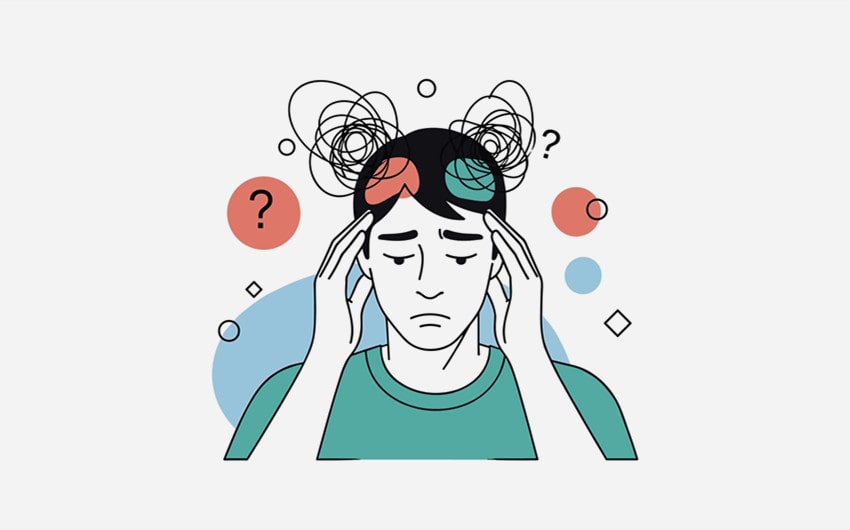How to Deal With Overthinking in a World Full of Confusion and Doubt
You accomplished all your tasks for the day. Now, all you wish for is to sit back and relax. Perhaps watch your comfort television show or continue your book.
But then, a very irritating but, your mind decides to fixate on all the things left unfinished and how they could go wrong.
Overthinking often strikes us when we are most in need of rest. It is no wonder that stressed-out working professionals and sleep-deprived parents so frequently face the brunt of it. Moreover, our world now offers many options, so many potentially better decisions… How do you even assure yourself without thinking and thinking some more?
Here’s some support that might help calm your mind when the overthinking is at its worst.
Some Grounding Techniques Actually Work
You may have heard of the “5-4-3-2-1” approach to feel calmer when your mind is full of racing thoughts. It asks you to name five things you can see, four you may touch, three you can hear right now, two you can smell, and just one you can taste. It might seem like a trite and Instagram-influencer-inspired approach that doesn’t accomplish much.
But it has actually worked for many, many people.
A Reddit user on [r/derealization] says:
“That combo of brain and body connection is what grounded me and prevented the situation from escalating.”
Another shares: “It works really well for me if I’m having an overstimulation meltdown or anxiety.”
At the same time, the technique makes the situation worse for some others. They feel hyperaware or more conscious of their surroundings, which does not spell relaxation. Instead, they may find a hot shower or lying down on the floor soothing. Distracting themselves with a favorite hobby or a physical activity, like running, works for many people.
The bottom line is that the same techniques don’t work for everyone who struggles with overthinking. But everyone can find, with time, something that works better than others.
For example, deep breathing exercises may help when you’re gripped by stage fright before an important presentation. Your mind conjures worst-case scenarios, bringing repeated thoughts of failure and rejection. In general, focusing on positive self-talk and separating yourself from your thoughts can help manage catastrophizing.
Parenthood Paranoia is Real
Overthinking is at its greatest height when you (or if you) decide to become a parent. Being responsible for delicate creatures without a manual can be overwhelming for the most resilient of us.
In the early years, the overthinking voice grows to its full majestic height, bombarding us with questions. Is the baby breathing well? What if they are not getting ample milk? The abundance of (mis)information available online makes it easy to go down the rabbit hole of anxiety and fear.
The problem is, the paranoia of parents may often be real. Of late, some parents in America are seeking legal counsel after their formula-fed babies came down with intestinal problems. A condition called Necrotizing Enterocolitis, or NEC, can affect preemies who consume formulas made from cow’s milk. The latest NEC lawsuit update states that the FDA demands clearer communication around product recalls.
According to TorHoerman Law, the situation became so grim because the manufacturers failed to warn parents of potential side effects. They could have received education on safer alternatives to consider.
This is only one instance of the situations that trigger the overthinking monster in parents. Many day-to-day activities can agitate the beast, from a skin rash that your poor detergent choice set off. Or a milestone that certainly got delayed because you didn’t do tummy time every evening.
It can be helpful to accept the reality of parenthood paranoia, telling yourself that most of these thoughts are inflated versions of reality. Treating fears with gentle self-talk and periodic consultations with pediatricians can be the best way to stay sane.
Seeking Therapy Is Not Dramatic
Popular culture would have us believe that “damaged” people go to therapy. You know, people who have experienced childhood misery or lived through their parents’ divorce at a young age. The truth is, therapy can help each one of us, and you needn’t be clinically depressed or traumatized to seek it.
Statista reports that around 60 million adults in the US received counseling for mental health in 2023. That’s unsettling and yet encouraging—at least people are getting the help they need.
Unfortunately, a large number still do not consider therapy or medication an option because they feel they can handle it. They also fear what loved ones will say, worrying that they will receive unpleasant labels.
Sometimes, racing thoughts could indicate a deeper problem like bipolar disorder. Verywell Mind explains that this goes beyond just overthinking into a territory where you cannot control your flight of thoughts. Only a professional can help you understand if your struggles with quietening the mind could be a symptom of another mental health concern.
Allow yourself to access the support you may benefit from. Therapists can help you figure out the best approaches to feel calmer and stop the perpetual mental noise that leaves you drained. Counseling can also enhance your sleep and concentration in daily activities. There’s a lot you can achieve when the mind isn’t constantly on overdrive over every minute thing.
Ultimately, there’s not much you can gain from overthinking. It terrorizes and consumes, doubts and agitates. Critical decisions may have a lot resting on them, but at some point, you have to trust your gut and judgment.







